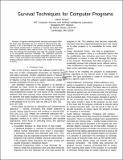| dc.contributor.author | Rinard, Martin C. | |
| dc.date.accessioned | 2005-12-14T19:48:20Z | |
| dc.date.available | 2005-12-14T19:48:20Z | |
| dc.date.issued | 2006-01 | |
| dc.identifier.uri | http://hdl.handle.net/1721.1/30300 | |
| dc.description.abstract | Programs developed with standard techniques often fail when they encounter any of a variety of internal errors. We present a set of techniques that prevent programs from failing and instead enable them to continue to execute even after they encounter otherwise fatal internal errors. Our results indicate that even though the techniques may take the program outside of its anticipated execution envelope, the continued execution often enables the program to provide acceptable results to their users. These techniques may therefore play an important role in making software systems more resilient and reliable in the face or errors. | en |
| dc.description.sponsorship | Singapore-MIT Alliance (SMA) | en |
| dc.format.extent | 50810 bytes | |
| dc.format.mimetype | application/pdf | |
| dc.language.iso | en | en |
| dc.relation.ispartofseries | Computer Science (CS) | en |
| dc.subject | Fault tolerance | en |
| dc.subject | Recovery | en |
| dc.subject | Failure-Oblivious Computing | en |
| dc.subject | Data Structure Repair | en |
| dc.title | Survival Techniques for Computer Programs | en |
| dc.type | Article | en |
